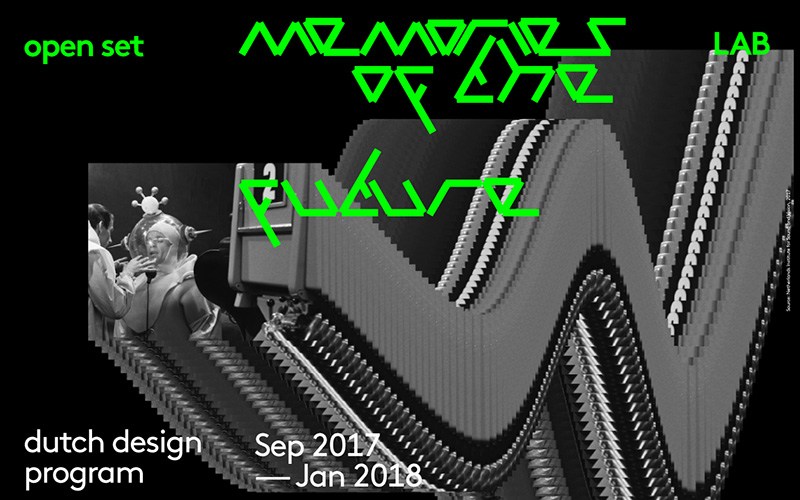OPEN CALL:Open Set Lab Memories of the Future Programme
 Open Set is pleased to announce Open Set Lab, a new research programme on the intersection between design, film, art and the humanities. The Lab comprises lectures, interactive real-time sessions and group critiques led by notable Dutch and international figures in design, art and research. To name a few: James Bridle, Catalogtree, Annet Dekker, Sebastian Groes, Johan Grimonprez, Arne Hendriks, Mishka Henner, Mediengruppe Bitnik, Martine Stig and Noam Toran.
Open Set is pleased to announce Open Set Lab, a new research programme on the intersection between design, film, art and the humanities. The Lab comprises lectures, interactive real-time sessions and group critiques led by notable Dutch and international figures in design, art and research. To name a few: James Bridle, Catalogtree, Annet Dekker, Sebastian Groes, Johan Grimonprez, Arne Hendriks, Mishka Henner, Mediengruppe Bitnik, Martine Stig and Noam Toran.
Theme: Memory of the Future
In light of the increasing complexity and uncertainty of the political, environmental and social challenges humanity is facing now, a growing number of events and publications are addressing the necessity and difficulty of envisioning alternative futures. There seems to be an urge for re-engaging with our heritage and memories, not only as the ‘source’ of the present condition but, paradoxically, as an instrument for planning the future. How can we de-mystify our historical conventions, re-contextualize our previous experience, give it new meaning based on present conditions and transform it for the future? How do we preserve the traces of the past, and how do we make sense of them in the digital age? Whether it be social network platforms, carefully curated collections, or state archives, how we archive and what we archive are unavoidable aspects that determine our memory.
The Lab investigates the power of agency held by designers and artists to create new tools, ways of thinking and visual or performative narratives that can reactivate our memory – and as a result, open up futuristic pluralities. However, the complexity of the global challenges described above calls for a concerted effort of research expertise in the domains of the arts, humanities, philosophy and technology.
The programme consists of three interconnected thematic trajectories:
- Mutation of the nature, meaning and practice of archives in the digital era. The contemporary archive as an authority that narrates collective memories versus a territory for creating subjective memories and futuristic pluralities.
- Visual strategies in audiovisual documents: the codified construction of events or facts. What role does fiction play in factual news reporting? The constructing of a public audience in the history of broadcasting: conventions, or contradictory evidence proposing an alternative public or alternative history of the same events?
- Algorithmic nature of contemporary data archives: curatorial dimension of algorithms for analyzing, searching and distributing content; influence of computer learning mechanisms on the design of archival algorithms. The archival process and archival infrastructure: misuse and disruption of systems that predetermine the usual direction of viewing and navigation.
Applications are accepted on a rolling basis. To apply, please visit the website. The deadline is 26/6/17.
